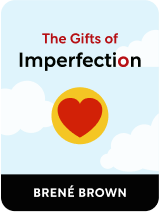

This article is an excerpt from the Shortform book guide to "The Gifts of Imperfection" by Brené Brown. Shortform has the world's best summaries and analyses of books you should be reading.
Like this article? Sign up for a free trial here .
What are Brené Brown’s 10 guideposts for Wholehearted living? How can following these guideposts help you develop worthiness?
In her book The Gifts of Imperfection, Brené Brown outlines 10 guideposts for Wholehearted living. The objective of these guideposts is to help you overcome your feelings of never being “enough,” and to live a happier, healthier life.
Continue below for Brené Brown’s 10 guideposts for Wholehearted living.
Guideposts for Living Wholeheartedly
In her book The Gifts of Imperfection, Brené Brown discusses the 10 guideposts for Wholehearted living: the behaviors that will help you to develop your worthiness and live a Wholehearted life.
Guidepost #1: Be Authentic
The first of the 10 guideposts for Wholehearted living is being authentic. This means having the courage to show all of your true self to the world, including your imperfections.
When you first decide to live authentically, you might worry about what other people will think of your true self. You may fear that your loved ones will reject your authentic self and prefer the “old,” inauthentic you. You may also fear judgment or shame if your authentic self goes against societal norms—for example, traditional gender norms. Research suggests that society expects women to be modest, slim, and kind. If you’re a woman whose authentic self doesn’t meet these expectations, you may be afraid to be yourself.
Unfortunately, people may disapprove of your authentic self. However, this disapproval is a small price to pay compared to the struggles you may face if you continue to live inauthentically. Reaffirming that your true self isn’t “good enough” to see the light of day will damage your worthiness. Likewise, Brown believes that refusing to live authentically can lead to depression, anxiety, rage, and resentment.
Guidepost #2: Combat Perfectionism
The second guidepost for living Wholeheartedly is fighting perfectionism. Perfectionism is the belief that if you can project the image of being perfect, you can avoid blame, shame, and judgment from others. To cultivate this “perfect” image, you try to hide your “imperfect” parts, such as your flaws, mistakes, and struggles.
The problem with perfectionism is that the expectations that it sets are unmeetable. Nobody is perfect, and nobody can hide their imperfections from the world forever. However, when you’re in the grip of perfectionism, these truths won’t occur to you. Instead, you’ll blame, shame, and judge yourself for failing to achieve these unrealistic standards. You’ll see your inability to be perfect as a sign that you’re not good enough, thus harming your worthiness.
To fight perfection, you need to accept that we all experience shame, blame, and judgment at times. Perfectionism can’t protect you from these feelings, making it ultimately pointless. Likewise, if you develop shame resilience, you won’t need to avoid shame because you’ll be able to deal with it when it arises. Therefore, you’ll no longer need to engage in perfectionism.
You also need to be self-compassionate. When you think or talk about your flaws and mistakes, be kind to yourself. Remember: nobody’s perfect, and it’s okay to make missteps. If you can learn to accept your imperfections, you’re less likely to be tempted by perfectionism.
Guidepost #3: Build Resilience
The next guidepost for living Wholeheartedly is building resilience: being able to use courage and inner strength to overcome adversity. If you lack resilience, you may be more vulnerable to threats to your worthiness. If you can’t rise above your struggles, you may start to feel that you’re not worthy of a happier life.
To build resilience, you need to do four things. First, you need to develop hope. Hope is a way of thinking that involves identifying your goals, devising pathways to meet these goals, and believing in yourself enough to follow these pathways. Hope increases resilience because it shows you that things won’t be tough forever. You can achieve your goals and improve your life.
Second, you should learn to critically analyze the societal expectations communicated through the media—for example, expectations of how you should look and behave. Evaluate whether these expectations are realistic and whether you should really strive to meet them. Trying to meet unrealistic expectations will only lead to failure and the feeling that you’re “not good enough.” This will reduce your resilience. It’s hard to push through tough times if you believe you’re not good enough to overcome your struggles.
Third, you should avoid using coping tools such as alcohol to numb negative emotions. Numbing yourself reduces the strength of your positive emotions, too. This makes being resilient more difficult. Many of us use memories of happy times to soothe ourselves when times are tough. You won’t be able to do this if you don’t fully experience happiness in the first place.
Finally, you should embrace spirituality. This means recognizing the existence of a religious or non-religious higher power that loves and connects us all. It may be easier to get through tough times if you believe that this compassionate power is looking out for you.
Guidepost #4: Practice Gratitude
The fourth guidepost for living Wholeheartedly is practicing gratitude. This means taking the time to express the things that you’re grateful for. For example, you could keep a gratitude journal, or do a gratitude meditation each morning.
You might think you’re too busy to practice gratitude, and that gratitude’s benefits won’t outweigh the time you’ll lose. However, practicing gratitude doesn’t require a huge time commitment. Even if you just spend a few minutes each day listing the things you’re grateful for, you’ll still feel the benefits.
Practicing gratitude has three benefits. First, it forces you to think about the good things in your life rather than the things that you lack. This boosts your worthiness. You’re more likely to feel “enough” if you keep contemplating the good things about yourself and your life.
Second, gratitude encourages you to appreciate the “ordinary” good things in your life. Society glamorizes being exceptional—for example, becoming famous or earning a fortune—and devalues smaller, more “ordinary” achievements. In contrast, gratitude invites you to appreciate all accomplishments—even small ones.
Finally, gratitude breeds joy. Brown defines joy as a deep contentment with life that is borne from feeling grateful. For example, it’s the fulfillment you feel when you recognize that you have a satisfying job that you’re deeply grateful for.
Barriers to Gratitude
The main barrier to gratitude is the fear of emotional pain. Gratitude is a vulnerable process because it highlights everything good in your life that you have to lose. You may fear the pain of loss so strongly that you refuse to practice gratitude at all. You might think that avoiding gratitude and joy will help you to avoid pain when things go wrong.
However, nobody can avoid pain entirely; we all experience it at some point. So you might as well allow yourself to experience gratitude and joy and have some good times along with the bad. Likewise, practicing gratitude and joy will help you to get through tough times. Reminding yourself that there is still good in the world will make your struggles easier to bear.
Guidepost #5: Use Intuition
The fifth guidepost for living Wholeheartedly is using your intuition. When you use intuition, your brain uses information from your past experiences to quickly and unconsciously attach meaning to something you’ve just observed. For example, it decides whether the situation you’re in is good or bad based on how similar situations have played out in the past. The meaning that your brain decides upon becomes your “gut feeling” about the situation.
Being willing to use your intuition is a crucial part of living Wholeheartedly. Believing that you can make good decisions, even unconsciously through your intuition, will increase your worthiness. Decision-making will become an area in which you feel you’re “good enough.” If you don’t use intuition, this aspect of your self-worth will never develop.
However, many of us are unwilling to act on our intuition due to the brain’s overwhelming need for certainty. We crave the feeling of being sure that we’re making the right choice. Intuition doesn’t always provide this certainty. Your brain creates “gut feelings” unconsciously, meaning you can’t be sure what information triggered the feeling or whether that information is valid. You can’t be certain that the feeling is correct, so you refuse to act on it.
To overcome the need for certainty, you need to embrace faith. Faith is a form of courage. It’s deciding that even though you can’t be sure what’s ahead, you’re going to move forward anyway. You’re willing to do so because you believe in the accuracy of your intuition and your ability to make good decisions.
Guidepost #6: Reject Comparison
The sixth guidepost for Wholehearted living is refusing to compare yourself to others. Comparison is rooted in competition and conformity. You want to conform to your social group’s norms, but do so “better” than everyone else. For example, if you live in a traditional suburb with identical houses, you might want to be “better” than your neighbors by having the greenest lawn or the nicest yard.
This attitude can damage your worthiness. It can cause you to base your self-worth on how well you compare to other people, or how well you’re conforming to your group’s norms. You may believe that you’ll only be “enough” if you meet certain standards of behavior. This is incompatible with the unconditional self-acceptance that underpins true worthiness.
You can avoid this comparative mindset by recognizing and celebrating your individuality. Remember that everyone has unique strengths and weaknesses. Likewise, we all have something special and original to contribute to the world. Because all humans are fundamentally different, trying to compare yourself to others is pointless.
Being creative may help you to develop your sense of individuality. When you engage in activities such as drawing and painting, you use your unique creative skillset to produce something original. Nobody else can express their creativity in the same way as you. In this way, creativity reminds you of your incomparability.
Guidepost #7: Embrace Play and Rest
Brown’s next guidepost for living Wholeheartedly is embracing play and rest. By “play,” Brown means doing things that have no real purpose simply because they bring you enjoyment. Play helps to boost your creativity, empathy, resilience, and happiness. By “rest,” Brown means getting enough sleep to feel refreshed. Not doing so can severely affect your physical health. For example, it may increase your risk of conditions such as diabetes and heart disease.
You may be reluctant to embrace play and rest because you’re caught up in society’s “hustle culture.” You’ve been taught that you need to be purposeful and productive at all times. This means you put work above frivolities like fun and sleep. However, bowing to the societal pressure to be productive can harm your worthiness. You may think that you’re only “good enough” if you spend all of your time working. This attitude ties your worth to what you do, not who you are, which goes against the principles of true worthiness.
To avoid this threat to your worthiness, you need to reject “hustle culture” and develop a healthier attitude towards work. Put your physical and mental wellbeing above productivity and remind yourself that you’re worthy no matter what you do or don’t achieve.
Guidepost #8: Practice Stillness and Calm to Fight Anxiety
The next guidepost for Wholehearted living is fighting anxiety by practicing stillness and calm. Anxiety stops you from living Wholeheartedly when it manifests as self-doubt: a fear that you’re not really “good enough.” This doubt will stop you from feeling truly worthy.
Practicing stillness and calm can help quiet your anxious doubts. Practicing stillness means taking time to be still and quiet: for example, meditating or praying. Doing so can quiet your loud, anxious thoughts and create some peaceful “space” in your mind. You can use this “space” to challenge your anxiety or just have a reprieve from your worries.
To practice calm, you need to do two things. First, you should put difficult situations into perspective. Consider whether they’re as bad as your anxiety is claiming. You may discover that the situation is easier to deal with than you first thought, and your anxiety will decrease.
Second, stop yourself from emotionally reacting instantly in stressful situations. For example, if a situation starts to frustrate you, don’t immediately express this emotion by getting angry with those around you. Take deep breaths or count to ten before you react. Doing so will allow you to cool off and consider whether getting angry will actually help the situation.
Guidepost #9: Use Your Gifts and Talents
Brown’s ninth guidepost for living Wholeheartedly is using your gifts and talents. The most obvious way to do this is to find a career that plays to your strengths. For example, if your talent is cooking, you could become a chef.
Many of us are in jobs that don’t make the most of our gifts and talents. Finding work that plays to your strengths can be tricky. However, Brown believes that doing so is worth the effort. Failing to use your gifts and talents can seriously harm your emotional state. For example, you might start to believe that you’re not contributing your full potential to the world. This can cause feelings of worthlessness that are incompatible with Wholehearted living.
Meanwhile, using your gifts and talents has various benefits. First, it gives you a sense of purpose. You can focus on finding work that puts your skills to good use. Second, if you’re spiritual or religious, you may feel closer to your higher power. You may believe that this power gave you your gifts and talents and using them fulfills its plan for you. Finally, each time you use your gifts and talents, you’ll be reminded that you’re “good enough” at something. This will boost your worthiness.
Barriers and Solutions
You may face three barriers to using your gifts and talents. First, you may doubt that you have any gifts or talents that are “good enough” to use. To overcome this doubt, tell yourself that it’s highly unlikely that this is the case. This is probably just low self-worth talking.
Second, society may have taught you that money and prestige matter more than doing work that plays to your strengths. To overcome this belief, question whether it’s a message worth adhering to. Considering it prioritizes money and prestige over happiness and being true to yourself, probably not.
Finally, you may struggle to find paid work that uses your gifts and talents. You can overcome this barrier by splitting your time between two types of work: work that pays your bills, and work that uses your gifts and talents. That way, you’ll get the best of both worlds.
Guidepost #10: Laugh, Sing, and Dance
The last of the 10 guideposts for Wholehearted living is incorporating laughter, singing, and dancing into your daily life. You might think that you’re too busy with work or family life to joke around, sing, or dance. However, it’s important to make time for these activities, even for just a few minutes a day. If you do, you’ll reap various benefits.
First, you’ll feel the elation that comes from expressing yourself freely—for instance, the happiness and excitement that comes from dancing like nobody’s watching. Chasing the feeling of elation helps to bolster your courage. It’s brave to stop caring what other people think and express yourself freely.
Second, singing and dancing can help you to manage your emotions. Finding a song that matches your mood and singing or dancing along may soothe you. It will also remind you that other people have experienced the emotions that you’re struggling with—not least the person who wrote the song. You may feel compassion for and a sense of connection with the artist.
Finally, laughing, singing, or dancing with another person creates a shared emotional experience that strengthens your connection. For example, if you and a friend are singing along to a sad song because you’ve both been through a breakup, you’ll share your heartbreak and feel closer.
Self-Consciousness
Laughter, singing, and dancing are bold, loud activities that go against the societal norm that we shouldn’t draw attention to ourselves. Engaging in norm-breaking activities can lead to feelings of self-consciousness. You may fear that others will judge you for failing to conform.
To break free from self-consciousness, have the courage to reject societal norms. Recognize that singing, laughing, and dancing will make you healthy and happy. Abandoning these activities just to conform and avoid judgment would be a betrayal of yourself and your wellbeing.

———End of Preview———
Like what you just read? Read the rest of the world's best book summary and analysis of Brené Brown's "The Gifts of Imperfection" at Shortform .
Here's what you'll find in our full The Gifts of Imperfection summary :
- How to stop feeling like you're not "good enough"
- How shame affects your self-worth
- The 10 guideposts to living Wholeheartedly and cultivating worthiness






